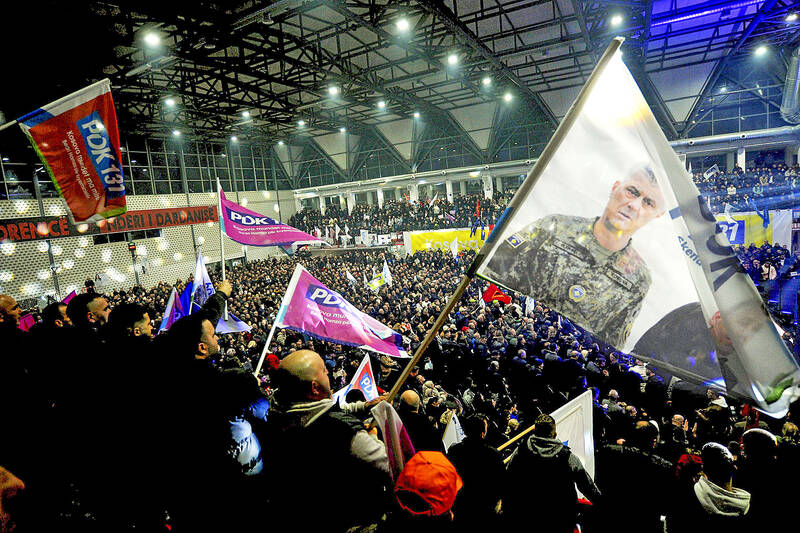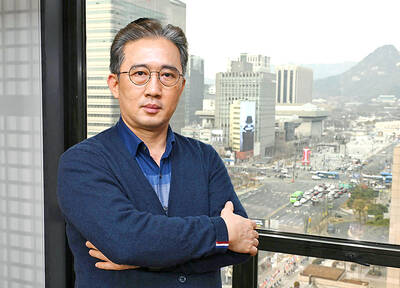Kosovo is to go to the polls tomorrow in a parliamentary election expected to be a key test for Prime Minister Albin Kurti after his governing party won in a landslide four years ago.
Eligible voters, including those of the diaspora, would cast ballots to elect 120 lawmakers among 26 political groupings and one independent candidate in a vote held from 7am until 7pm. The Serb minority has 10 secured seats while 10 more are for other minorities.
This is the first time since independence in 2008 that Kosovo’s parliament has completed a full four-year mandate. It is the ninth parliamentary vote in Kosovo since the end of the war from 1998 to 1999 between Serbian government forces and ethnic Albanian separatists that pushed Serbian forces out following a 78-day NATO air campaign. Serbia does not recognize Kosovo’s independence, proclaimed in 2008.

Photo: AP
Kurti’s left-wing Vetevendosje! or Self-Determination Movement Party is seen as the front-runner, but is not expected to win the necessary majority to govern alone, leaving open the possibility the other two contenders join ranks if he fails to form a Cabinet.
“On Feb. 9 we vote for the future,” Kurti said. “We vote for Vetevendosje!”
The other contenders are the Democratic Party of Kosovo (PDK), whose main leaders are at The Hague tribunal accused of war crimes, and the Democratic League of Kosovo (LDK), the oldest party in the country that lost much of its support after the death in 2006 of its leader, Ibrahim Rugova.
During the election campaign, the parties made big-ticket pledges to increase public salaries and pensions, improve education and health services, and fight poverty. However, they did not explain where the money would come from, nor how they would attract more foreign investment.
“We have a plan for each city, each family, each persons,” said Bedri Hamza of the PDK.
“We have an alternative to guarantee a better life in Kosovo,” said Lumir Abdixhiku of the LDK.
Kosovo, with a population of 1.6 million, is one of the poorest countries in Europe with an annual gross domestic product of less than 6,000 euros per person.
Kosovo has also been affected by Washington’s imposition of a 90-day freeze on funding for different projects through the US Agency for International Development (USAID), which has been key in promoting the country’s growth. The US has invested US$2 billion in Kosovo since 1999, including investments of more than US$1 billion from USAID.
The vote would determine who would lead the Kosovo side in stalled normalization talks with neighboring Serbia, facilitated by the EU to get both sides closer to joining the bloc.
Kurti has been at odds with Western powers over some Cabinet actions last year, such as a ban on using the Serbian dinar and transfers from Serbia to citizens of Kosovo who depend on social services and payments.
Washington, Brussels and the Kosovo Force (KFOR) — a NATO-led stabilization force — have urged the government in Pristina to refrain from unilateral actions, fearing the revival of inter-ethnic conflict.
The EU and the US have urged the two sides to implement agreements reached two years ago that include a commitment by Kosovo to establish an Association of Serb-Majority Municipalities. Serbia was also expected to deliver on the de facto recognition of Kosovo.
KFOR increased its presence in Kosovo after last years’ tensions and added more for the parliamentary election period.

VAGUE: The criteria of the amnesty remain unclear, but it would cover political violence from 1999 to today, and those convicted of murder or drug trafficking would not qualify Venezuelan Acting President Delcy Rodriguez on Friday announced an amnesty bill that could lead to the release of hundreds of prisoners, including opposition leaders, journalists and human rights activists detained for political reasons. The measure had long been sought by the US-backed opposition. It is the latest concession Rodriguez has made since taking the reins of the country on Jan. 3 after the brazen seizure of then-Venezuelan president Nicolas Maduro. Rodriguez told a gathering of justices, magistrates, ministers, military brass and other government leaders that the ruling party-controlled Venezuelan National Assembly would take up the bill with urgency. Rodriguez also announced the shutdown

Chinese President Xi Jinping’s (習近平) purge of his most senior general is driven by his effort to both secure “total control” of his military and root out corruption, US Ambassador to China David Perdue said told Bloomberg Television yesterday. The probe into Zhang Youxia (張又俠), Xi’s second-in-command, announced over the weekend, is a “major development,” Perdue said, citing the family connections the vice chair of China’s apex military commission has with Xi. Chinese authorities said Zhang was being investigated for suspected serious discipline and law violations, without disclosing further details. “I take him at his word that there’s a corruption effort under

China executed 11 people linked to Myanmar criminal gangs, including “key members” of telecom scam operations, state media reported yesterday, as Beijing toughens its response to the sprawling, transnational industry. Fraud compounds where scammers lure Internet users into fake romantic relationships and cryptocurrency investments have flourished across Southeast Asia, including in Myanmar. Initially largely targeting Chinese speakers, the criminal groups behind the compounds have expanded operations into multiple languages to steal from victims around the world. Those conducting the scams are sometimes willing con artists, and other times trafficked foreign nationals forced to work. In the past few years, Beijing has stepped up cooperation

The dramatic US operation that deposed Venezuelan president Nicolas Maduro this month might have left North Korean leader Kim Jong-un feeling he was also vulnerable to “decapitation,” a former Pyongyang envoy to Havana said. Lee Il-kyu — who served as Pyongyang’s political counselor in Cuba from 2019 until 2023 — said that Washington’s lightning extraction in Caracas was a worst-case scenario for his former boss. “Kim must have felt that a so-called decapitation operation is actually possible,” said Lee, who now works for a state-backed think tank in Seoul. North Korea’s leadership has long accused Washington of seeking to remove it from power